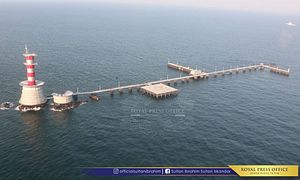Last week, the International Court of Justice (ICJ) announced that it would hold public hearings in June related to Malaysia’s new challenge of its previous ruling on a decades-long island dispute with Singapore over Pedra Branca/Pulau Batu Puteh. The announcement marks just the latest development following the recent revival of the dispute that continues to loom over the broader bilateral ties.
As I have noted before in these pages, Malaysia and Singapore have had a rather prickly relationship in the past, and despite some significant improvements in ties over the past few years, problems still tend to arise in ties from time to time in part due to domestic politics (See: “Malaysia-Singapore Relations in the Spotlight with 2017 Leaders’ Retreat”).
Pedra Branca is a case in point. Though the International Court of Justice (ICJ) ruled back in May 2008 that Singapore had sovereignty over it after a decades-long row, Malaysia filed a new application to the ICJ in February 2016 to revise the judgment citing new evidence from documents discovered in British archives, with a separate application for interpretation filed in June 2017. In doing so, Malaysia effectively revived the decades-long dispute and complicated a historically rocky bilateral relationship.
While Malaysian officials had insisted that the Southeast Asian state was simply exercising its right to pursue any outstanding legal claims it might have, skeptics dismissed it as nothing more than an attempt by the government of Malaysian Prime Minister Najib Razak to shore up its declining support at home with an election looming (See: “The Danger of Najibizing Malaysia’s Foreign Policy”). Singapore Prime Minister Lee Hsien Loong himself has publicly suggested that domestic politics could be at play in comments that have been met with criticism in Malaysia.
Since then, we have seen other developments subsequently as well on the issue, including occasional maritime accidents that have drawn attention to the dispute as well as Malaysia’s unveiling of a new maritime base nearby (See: “Malaysia Reveals New Maritime Base Near Disputed Island with Singapore”). Meanwhile, routine developments in the wider bilateral relationship have continued, including the last iteration of the annual Leaders Retreat which was held in January between Najib and Singapore Prime Minister Lee Hsien Loong.
Last week, the ICJ officially announced that it would hold public hearings in June for the two cases brought by Malaysia against Singapore on Pedra Branca. The hearings, which will be held at the Peace Palace in The Hague, Netherlands, will start on June 11 and there will be four days of public hearings, from June 18 to June 19 and from June 21 to 22.
The hearings will come amid a busy domestic year for both sides. Malaysia is about to hold a general election that Najib is preparing for, and Singapore going through a longer transition that will eventually see Lee replaced by a new leader, likely sometime after the city-state’s next general election, which must be held by January 15, 2021. Apart from its usual domestic and foreign policy priorities, Singapore also holding the rotating chairmanship of the Association of Southeast Asian Nations (ASEAN) in 2018 that tends to draw even greater international attention to the city-state’s affairs.
Though the revival of the Pedra Branca issue has attracted much media attention considering its importance within the broader relationship, it remains unclear whether all this will ultimately add up to much. While Malaysia has said it remains confident of its own position, Singapore has said it strongly believes that the new documents do not satisfy the criteria laid out for a revision of a judgment, and it has also since put together a high-powered legal team to fight the case. Both governments have also been careful to emphasize that this one issue ought not to define the wider bilateral relationship where advances continue to be made. The extent to which this remains true as the proceedings advance, however, remains to be seen.

































